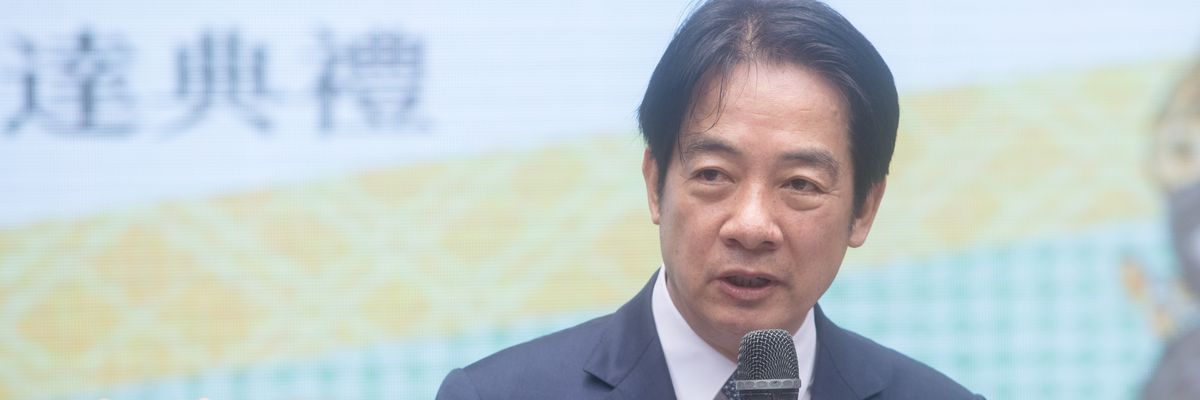With about 120 days remaining until Taiwanese voters head to the polls for the January 2024 presidential election, it’s evident that Lai Ching-te, the candidate of the ruling Democratic Progressive Party (DPP), has established a clear lead over each individual contender (although not when the combined strength of the others is taken into account).
Although some public opinion polling has shown a strong sentiment for change in 2024, Lai has been consistently ahead with support fluctuating at around 35 percent, while his opponents have scored an aggregate of around 50 percent since May. And his prospects have improved even more since the founder of electronics manufacturing giant Foxconn, Terry Gou, formally declared his candidacy in late August, further fragmenting Lai’s opposition by creating a third opposition candidate alongside Ko Wen-je of the Taiwan People’s Party (TPP) and Hou Yu-ih from the Kuomintang (KMT).
Even though Hou, Ko, and Gou have all declared a readiness to forge a coalition — a strategy that has emerged as the only plausible possibility of thwarting Lai’s occupancy of the presidential palace – the prospect of each assuming a subordinate role in another’s campaign likely remains highly unattractive to them, especially to Gou. Moreover, should any party display a willingness to make concessions, reaching consensus will likely require meticulous, confidential, and protracted negotiations.
Given the current trend, a critical question looms large regarding the future of U.S.-China relations: Are Washington and Beijing prepared for another DPP administration in Taiwan led by Lai Ching-te, the self-proclaimed “political worker of Taiwan Independence?” Are the two powers ready for the unique set of risks that a Lai-led government in Taiwan could pose to their bilateral relations?
As an avid baseball fan, Lai used to describe himself as a “relief pitcher” on the political mound, an observation elaborated by President Tsai Ing-wen, who praised Lai as a “skillful pitcher.” Unfortunately, however, in terms of stability across the Taiwan Strait, what Lai could be skillful at is possibly delivering a “strikeout” scenario to the already fragile Sino-U.S.-Taiwan triangle.
Lai’s “strike one” could very well exhaust Beijing’s strategic patience regarding peaceful unification. While discussions swirl about the possibility of Beijing having set a reunification deadline — some U.S. analysts argued for a 2027 timeline, others a 2035 deadline for forceful unification — these predictions often overlook the role that Taiwan’s domestic politics could play in affecting Beijing’s calculations.
Beijing would likely be hesitant to confront a Taiwan leadership aligned with the “92 consensus” should the KMT’s Hou pull off next year’s presidential election. However, a third consecutive triumph for the DPP’s presidential bid led by one of the mainland’s least favorite Taiwanese politicians might lead Beijing to conclude that Taiwan’s public sentiment has irreversibly shifted in favor of formal independence. If so, the prospects for much greater Chinese pressure on Taiwan – perhaps even a coercive takeover – could increase considerably.
“Strike two” on Lai’s part would be the impact of his policies on the efficacy of Washington’s longstanding “dual deterrence” strategy regarding the Taiwan Strait, an approach intended to discourage unilateral changes to the status quo by both Beijing and Taipei. Within the DPP, Lai is seen as a political figure deeply aligned with pro-independence forces, as witnessed by the more extreme stance he took during his challenge to President Tsai in the DPP primary in 2019. Lai’s label, promoted at the time as the “golden grandson of Taiwan Independence” frequently evokes parallels with former Taiwan president Chen Shui-bian’s moniker of “son of Taiwan.”
In recent months, some in the United States have seemed to cast doubt on Lai’s stated intention to maintain the status quo. However, there is also strong support for Lai’s pro-independence stance in Washington, especially in Congress. A Lai victory in next year’s election would likely embolden support for Taiwan Independence in Congress and elsewhere and encourage him to alter President Tsai’s relatively cautious stance on cross-strait issues and adopt more assertive pro-independence policies, thus undermining Washington’s “dual deterrence” strategy.
Lai’s “strike three” would be the blow that he could deliver to Taiwan’s economic prosperity. Despite President Tsai’s effort to pursue economic diversification from China through initiatives such as the “New Southbound Policy,” Taiwan’s economic growth still largely relies on China. As Taiwan’s biggest trading partner, China (Hong Kong included) accounted for nearly 40 percent of Taiwan’s total trade in 2022. Taiwan’s trade surplus with the mainland and Hong Kong even surged to $100.43 billion in 2022 from $66.66 billion in 2016. Such growth could be explained by China's tireless effort to woo Taiwan through economic incentives, as well as the geographically and culturally entwined relationship between Taiwan and the mainland.
However, China has also been active in using economic disincentives, by stifling trade and exchanges on certain targeted commodities, to pressure Taiwan. Concerns have recently surfaced about China’s possible intention to terminate the Economic Cooperation Framework Agreement (ECFA) with Taiwan if Lai were to be elected. Although many argue that such a move itself would have only a limited impact on Taiwan’s economy, the deeper implications for Taiwan could be substantially negative, as Taiwan’s prosperity relies on investors’ faith in a secure and stable environment.
Of course, Lai rejects the notion that his presidency would constitute a “strikeout” for Taiwan. In a Bloomberg interview in August, Lai stressed his commitment to peace and the importance of upholding the status quo. In late August, he even playfully conveyed his willingness to share shrimp fried rice and bubble tea with Chinese President Xi Jinping in what was intended as a goodwill gesture.. In early September, Lai stated that he would “fight for peace” and seek cooperation with China if elected.
In the eyes of many in Taiwan and across the globe, Lai’s rebuttals present a compelling case. There are valid concerns regarding the KMT’s pro-Beijing stance and the relative inexperience of the four-year-old TPP’s ability to run a national government. These concerns revolve around the potential consequences: either strengthening China’s sway and influence within Taiwan if the KMT should win, or weakening Taiwan’s governance under the TPP at a time when the need for internal strength and unity is paramount in countering China’s mounting pressure.
Terry Gou’s candidacy raises even more pronounced concerns, primarily stemming from the fact that Foxconn, the multinational company he founded, possesses billions of dollars in assets located within mainland China. This substantial economic stake potentially provides Beijing with significant leverage over a President Gou.
These concerns have led many observers to view a government led by Lai as the least risky option, albeit not without its challenges.
But a Lai victory in January 2024 will clearly pose major challenges to both Washington and Beijing. It is imperative that both capitals carefully think through the possible consequences that could result from such a development and consider policies designed to avert them. Doubling down on extreme opposition to a President Lai through coercive means (by Beijing) or greater political support for his pro-independence instincts (by Washington) could prove disastrous.
- Does the US have a favorite in next Taiwan election? ›
- Senate delegation throws new twist into US-China ties - Responsible Statecraft ›
- Coalition emerges to challenge ruling party in Taiwan - Responsible Statecraft ›
- Could Taiwan election make US-China relations worse? | Responsible Statecraft ›
- Inauguration of Taiwan’s new president triggers usual pearl-clutching | Responsible Statecraft ›
- Taiwan's president turns up heat against China — way up. | Responsible Statecraft ›
















